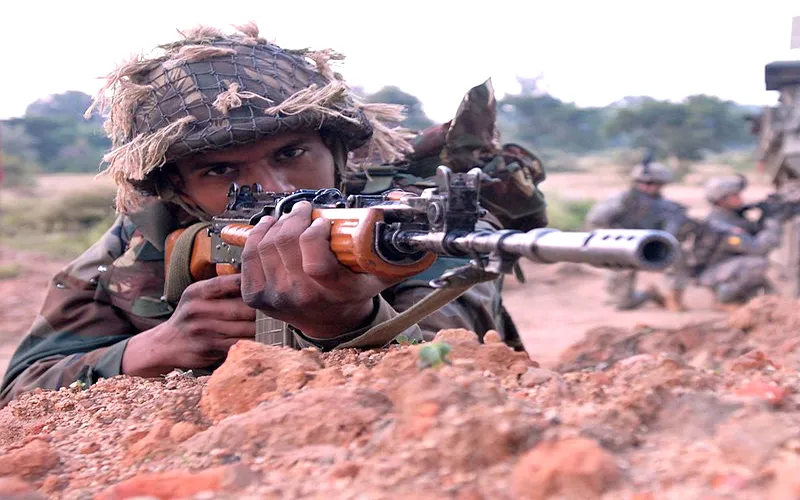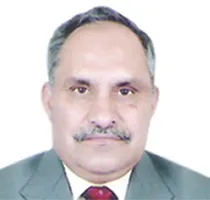-
CENTRES
Progammes & Centres
Location
Instead of amending the AFSPA, putting the military in harm's way and then watching it unravel, the political class must have the willpower to send the military back to the barracks and let the civilian Government do its job.

It was in February 2013 that a journalist first referred to "an abomination called the Armed Forces (Special Powers) Act". We now have a former Home Minister, saying much the same; with the Chief Minister of Jammu & Kashmir, aware that his chances of re-election are small, adding to the chorus. The true abomination, despite all that these gentlemen believe, is not that the AFSPA gives the Army untrammelled powers but, the fact that you need to invoke such an Act seven decades after independence.
It is clearly the job of the political establishment, with the help of bureaucrats and the police, to ensure good governance and a peaceful environment within the country, while the primary job of the Armed Forces is to ensure the territorial integrity of the country. If for reasons of mis-governance, lack of vision and short-sightedness compounded by inefficiency, corruption and greed, populations in parts of the country become restive and take to arms against the Government of the day, the fault lies squarely with the politicians and their lack of ability and leadership.
If the situation reaches such a pass that the Government is unable to carry out its functions, even with the help of the law and order machinery at its disposal, and the integrity of the nation is in grave threat, it stands to reason that the Government has little choice but to induct the Armed Forces to deal with the prevailing situation.
The Armed Forces will have to impose their authority, by all means necessary, to bring down violence so that the Government may re-impose its authority and re-commence its functions.
This makes the Armed Forces a measure of last resort. If the Forces fail, our territorial integrity, democratic institutions and our way of life will be at grave risk. This places an enormous burden on the Forces and requires that every move or action that they initiate is wholly credible, so that the disaffected population understands the consequences of disobedience.
As the old adage goes: Actions speak louder than words. This requires the Armed Forces to act with all means at their disposal to ensure that there are no breaches of their directions. Thus, if they establish a vehicle check post then, it is incumbent that all measures are in place to ensure that no vehicle can take evasive action or disobey orders to stop. Sometimes, this means that the troops may have to open fire to bring the vehicle to a halt. This is what happened in Chattergam in Jammu & Kashmir recently where two teenagers tragically died when they did not stop at a vehicle check post and were halted by troops opening fire at them.
Anybody who suggests that the soldiers' actions were heavy handed and that they should have aimed at the tyres or fired in the air or chased the car, lacks understanding of military tactics and is utter ignorant of the military's credibility.
Had the soldiers responded differently and failed to stop the car, and subsequently it had emerged that the car was carrying militants or weapons or was a car bomb, the same people who condemned the troops' actions would have had some very harsh words to say about their efficiency and professionalism.
Whether the troops acted as per the rules is for the Court of Inquiry to ascertain. Meanwhile, the parents of the children need to be held responsible. They should face criminal action for having permitted their underage children to drive a car without a license.
While the parents are traumatised by the tragic event, so are the troops who did their duty. These men are also humans with families and children of their own. They have to live with the consequences of what happened for the rest of their lives. To brand them as murderers and criminals is unjust.
It is in this context that the prompt action taken by the Corps Commander, Lieutenant General Subrata Saha, must be understood. He apologised to the families and offered compensation, not because the troops had erred (that is yet to be ascertained), but because such a tragedy occurred and youngsters lost their lives.While the youth definitely erred in not stopping, their error, in hindsight, is understandable though not condoned, in a different setting, in a place that does not require the use of Armed Forces to restore governance.
This brings us face-to-face with the reality that former Union Home Minister P Chidambaram, and those who support annulling or amending AFSPA, must confront. The Armed Forces have no legal cover for operating in areas where a situation akin to a civil war prevails. Only AFSPA provides it the statutory cover it requires if its actions are to be effective and credible.
Instead of amending the Act, putting the military in harm's way and then watching it unravel, the political class must have the willpower to send the military back to the barracks and let the civilian Government do its job. It will also have to accept responsibility for the consequences, and unless it is willing to do so, talk is cheap.
(The author, a retired Army officer, is a consultant with the Observer Research Foundation)
Courtesy: The Pioneer, December 2, 2014
The views expressed above belong to the author(s). ORF research and analyses now available on Telegram! Click here to access our curated content — blogs, longforms and interviews.

Brig. Deepak Sinha (Retd.) was Visiting Fellow at ORF. Brig. Sinha is a second-generation paratrooper. During his service, he held varied command, staff and instructional appointments, ...
Read More +